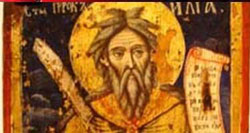By Theresa Doyle-Nelson

During [the] night Paul had a vision. A Macedonian stood before him and implored him with these words, “Come over to Macedonia and help us.” ~ Acts 16:9
It was about two decades following the death of Christ when Saint Paul brought Christianity into Europe. One evening while fast asleep in Troas (western Turkey), Paul dreamt of a Macedonian pleading with him to evangelize in Macedonia.* When Paul awoke, he felt confident that the Holy Spirit was leading him to the Roman province. So, along with his missionary companions, Paul began the journey across the Aegean Sea.
They entered Macedonia/Europe through the port city of Neapolis, but continued on until they reached Philippi. Paul’s preaching in Philippi was fruitful, even though he endured a beating and imprisonment, followed by an urgent request by authorities to leave! Still, Paul and the Christian Philippians developed a comfortable bond and this kind community gave him both emotional and financial support. But, who were these people? What names and personalities emerge from the biblical Christians of this city? The 16th chapter of Acts gets us started with learning about these earliest European Catholics.
Lydia the Purple-Seller
When Paul and Silas (and possibly Luke) first arrived in Philippi, they spent some time in the city and then went to a riverbank, hoping to find a place of worship. There, Paul found a group of women and began to share the story of the Lord, Jesus Christ. In the midst of his discourse, one of these women, Lydia, had a profound conversion, embracing all Paul spoke of. Lydia actually had her whole household in Philippi baptized and then invited (practically insisted, actually) the men to stay at her home during their time in Philippi. This Lydia was a business woman who dealt in purple cloth -- she is therefore sometimes referred to as “Lydia Purpuraria” -- Lydia the Purple-Seller. She evidently had roots in Asia Minor (Turkey) for she was said to be of Thyatira, an ancient city there (in a region curiously called “Lydia”). After being baptized, Lydia generously let her home in Philippi be used as a house church for the growing number of Christians in the European city. She is listed in the Roman Martyrology (official book of saints) and her feast is celebrated on May 20. Read about her in Acts 16:11-15, 40.
The Slave Girl
After baptizing Lydia and her household, Paul and Silas went about Philippi preaching the message of Christ. One day, a slave girl intriguingly began to follow them around. This slave girl had fortune-telling abilities and her owners were able to make a nice profit from this talent of hers. However, when she happened across Paul and Silas and heard the words they spoke, she felt compelled to trail behind them loudly pronouncing, “These people are slaves of the Most High God, who proclaim to you a way of salvation.” Surely Paul did not mind at first; any praising of the Lord had to be enjoyable to his ears. However, after several days, it understandably grew annoying. So, he turned to the girl and commanded the spirit within her to leave. Which it did. So, the exasperating shouting was gone . . . and so was the girl’s ability to tell fortunes to customers in Philippi. This financial loss outraged her owners who riotously brought Paul and Silas to the local authorities. The magistrates had the men stripped, beaten, and thrown into prison. Luke (the author of Acts) does not share what happened to the slave girl after this experience. It’s a hopeful thought, however, that her experience brought her to believe in the news of Christ. Likely her owners would not have allowed her to openly accept the faith, but I like to ponder the possibility that at least quietly in her heart she did. Read about her in Acts 16:16-24.
The Jailer
While the battered Paul and Silas sat in the Philippian prison, they began to pray and sing hymns, seemingly little impacted by their dire circumstances. Near midnight, the ground surprisingly began to rumble. Before they knew it, they were living through an earthquake that shook so powerfully their chains broke loose and the door fell open. They then noticed the guard about to take his own life, distressed over escaped prisoners. The Holy Spirit nudged the now-freed Paul and Silas to stop the jailer from harming himself and to offer him comfort.
The overwhelmed guard went from terrible fear to hope. He asked Paul and Silas for advice on how to be saved and the missionaries gently told the distraught man all about Christ. The jailer, struck by the message, cleaned the wounds of Paul and Silas, brought them to his home and gave them a meal to eat. He then had his whole family baptized. At daybreak, Paul let his Roman citizenship be known, which prompted a hasty release and an anxious plea from the city magistrates that the men leave Philippi (beating a Roman citizen was illegal). The rest of the story of the jail guard is unrecorded, however, it seems feasible that he learned of Lydia’s house church and began to attend meetings there with his family. Perhaps the two families became wonderful friends in Christ. Read about him in Acts 16:25-40.




